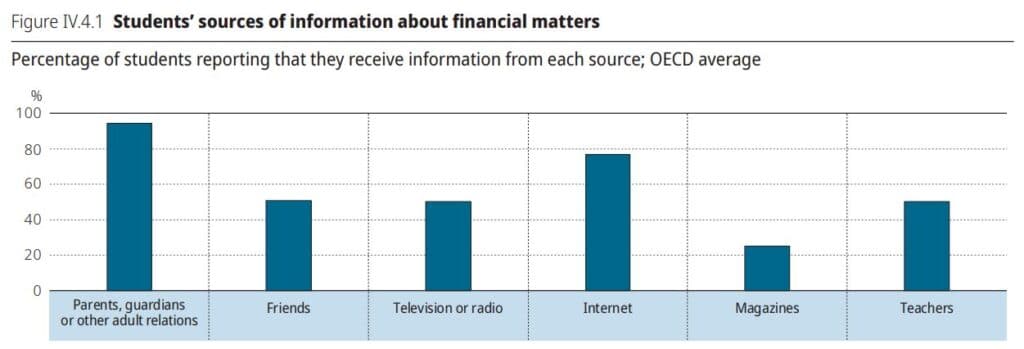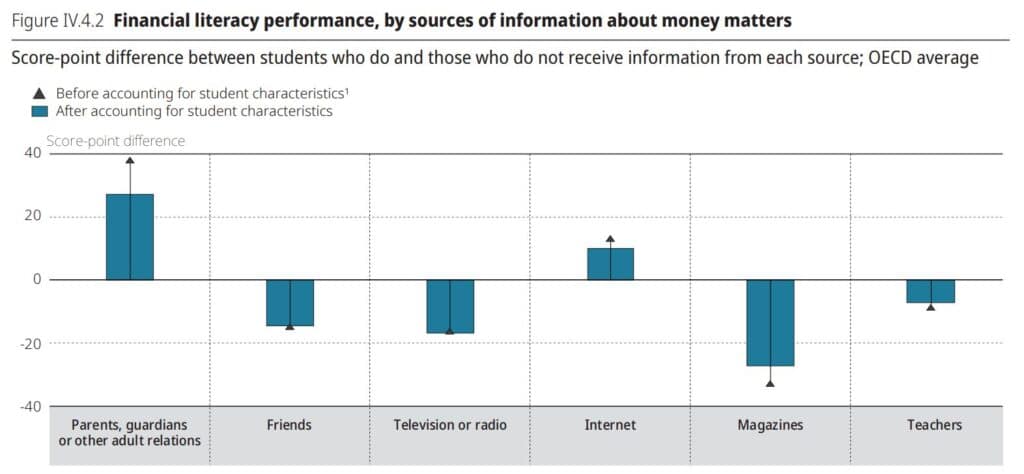Whether it’s the whispers between acquaintances in passing or anecdotes shared on Twitter and Facebook, there’s no shortage of scary stories about the lack of financial literacy in the United States. Most problems start at an early age. Have you ever thought about explain money to your child?
Related Articles in this blog:
Table of Contents
Many People Lack of Financial Literacy
As PISA research shows, around one in four students are unable to make even simple decisions on everyday spending. And this problem carries over into adulthood, with more than one-third of American adults postponing major life decisions due to money problems. Of course, money isn’t everything. However, it is a big part of life. Money affects everything from where you live to whether or not you can have children. You know all of this, sure. But does your child? By glancing at the statistics, we can get bey that they don’t know about money and how it may affect them. As a parent, your job is to explain this to them.
Are you not quite sure about that?
11 Reasons to Explain Money With Children
You have a young child, and they still believe in Santa Claus and the Tooth Fairy. Indeed, now is not the time to bring up such a taboo topic as money, right?
Wrong. There are plenty of reasons why you should explain money with your children early and often. To help you realize this, we’ve compiled a list of 11 reasons:
1. Society environment has been changed
What does our children facing today? The public and private benefit system like pension and health continually shrinking; the financial services is more and more sophisticated, particular to young generations (P2P, crypto currency etc.); the more uncertain and precarious financial and employment situation that could last long; also the critical decision to be made in the short term that will impact future financial wellbeing.
All of the above reasons forms a challenging environment for our next generation. Moreover, children do not see real money anymore, they are so used to credit card and mobile payment. My 5 year old son has a birthday wish to get a phone, because he think the phone is magic with money inside.

2. You Have Time to Explain Money
Is financial literacy explain money in your child’s school? No? Then you have time to do it. Not sure that you have time to do it? In that case, you better find the time. These days, more than 25% of all professional jobs in North America give the option of working remotely.
If you don’t have time due to commuting, you better find the time. If you don’t have time after work, you better find the time. You’re a parent; your child is your top priority. As showed below, 94% of students reported that they obtain such information from parents.

3. Losing Jobs and Assets is a Real Possibility
In today’s world, no job is secure. Technology has led to the rise of the gig economy and the fall of many long-standing industries. Even if you think your job is safe, there’s always a chance it could be automated or outsourced in the future.
The same goes for assets. In 2008, millions of Americans lost their homes to foreclosure, and many more lost a significant portion of their retirement savings.
Although we’ve health with the pandemic, you never know when the next crisis will happen. If you don’t teach your children about money now, they could lose everything in the future.
4. You Can Set a Good Example in Money Management
If you want your children to be financially responsible, you need to set a good example. This starts with how you handle money yourself. Do you save regularly? Do you invest in yourself? Do you live below your means?
Your children are watching, and they will follow your lead. So, if you want them to be financially responsible, you need to show them how it’s done. Again from the report, students who obtain information about money matters from their parents scored 38 points higher in the financial literacy assessment than students who do not obtain such information from their parents.

5. You Can Help Them Avoid Debt
Debt is a significant problem in the United States. The public debt of the US in 2022 is hovering around $30 trillion. When the country is in debt, the people are always struggling. Even if you aren’t in debt, can you guarantee that you won’t be in a few years?
Is that something you want for your children? Of course not.
By talking to them about money now, you can help your children avoid debt in the future. You can show them how to live below their means and save for big purchases. This will put them on the right track and help them stay out of debt later in life.
6. They Need to Know How to Budget
Budgeting is one of the most important financial skills your children can learn. Yet, it’s also one of the most underrated. A recent study found that only around 33% of American households have a budget.
That is a problem because budgeting is essential to financial success. It allows you to track your income and expenses so that you can make informed decisions about your money.
If you don’t teach your children how to budget now, they will struggle later in life. They will make poor financial decisions, and they will end up in debt.

7. They Need to Know How to Invest
Investing is another essential financial skill that your children need to learn. Unfortunately, it’s also one of the most misunderstood topics in personal finance.
Many people think that investing is only for the rich, and others think that it’s too complicated and risky. But the truth is, anyone can invest, and it’s not as complex or risky as you might think.
Investing is a great way to grow your wealth over time. And, if you start early, it can be an incredibly powerful tool. For example, if you invest $100 per month for 40 years, you could have over $1 million.
That is why it’s so important to teach your children about investing now. If you don’t, they could miss out on a lot of money later in life.
8. They Need to Know How to Save
A recent study found that only 40% of Americans have enough savings to cover a $1,000 emergency. That means that 60% of Americans would have to borrow money or sell something if they had a $1,000 emergency.
Can you imagine if your child had an emergency and didn’t have any savings? It would be a disaster.
That is why it’s so important to teach your children about saving now. It would be best if you showed them how to build up an emergency fund and save for their future.
9. They Need to Know How to Spend
Spending is another important financial skill that your children need to learn. And, like budgeting, investing, and saving, it’s also one of the most underrated skills in personal finance. Students who were more independent in their financial affairs performed better in the PISA 2018 financial literacy assessment.
Many people think that spending is a bad thing. But the truth is, spending is a necessary part of life. You can’t save or invest all of your money. You need to spend some of it too. The key is to spend wisely. Only buy things you need, which will improve your life somehow.
If you teach your children how to spend wisely now, they will be better off later, make more intelligent decisions with their money, and live a better life as a result.

10. They Need to Know How to Make money
What’s your ultimate financial goal? Is it to retire early? To travel the world? To buy a new house?
Whatever your goal is, your children need to know how to make money. They need to know how to earn an income and how to grow their wealth over time.
There are a lot of ways to make money. But, the best way to teach your children is to show them how you make money. You can talk to them about your job, your business, or any other projects that you’re working on.
11. They Need to Know How to Give Money
Giving is important because it helps others. But, it’s also important because it makes you feel good. When you give to someone, it makes you happy.
That is why it’s so important to teach your children about giving now. You need to show them how good it feels to help others. And, you need to encourage them to give whenever they can.
Giving doesn’t have to be all about money. A child can help by offering other things, and they can give their time, their talents, or even just a simple act of kindness.
In Conclusion
These are just a few reasons why explain money with children is so important. If you start early, you can instill financial solid values in your children that will last a lifetime.
About Me
Hi, there. I am Lin. Together with my husband and two kids, we live in the beautiful Netherlands in Europe. I am dedicated to self-development, creating quality time for the whole family, and fully supporting kids with their potentials with all I have learned from engineering, MBA, and 10+ years of working experience in the energy sector.



16 Comments
Comments are closed.